Nominate A Great Recycler/Reducer/Reuser/Composter!
The Emmet County Recycler of the Year Award honors individuals and businesses who have made an outstanding contribution to recycling, composting, or--even better--waste reduction or reuse in Emmet County. To nominate someone for the award contact our Communications Coordinator at 231-348-0640 or via email.
2023 2022 2021 2020
2024 - New Beginnings Resale

At Emmet County Recycling, we understand that true sustainability goes beyond bins and facilities—it thrives when communities embrace the spirit of reduce, reuse, and recycle. This year, we are honored to recognize New Beginnings Resale Store as the Recycler of the Year, a stellar example of environmental stewardship and community care.
A Legacy of Service and Sustainability
New Beginnings Resale Store is more than a thrift store; it’s a ministry of Holy Childhood of Jesus Parish, a non-profit organization dedicated to uplifting Emmet County and its neighbors. Since its modest start in a Catholic school basement, the shop has grown into a bustling 24,000-square-foot hub of reuse, driven by a dedicated team of staff and volunteers, committed to minimizing waste and reinvesting in the local community. Their mission is to offer merchandise at low and reduced prices, providing a convenient system for recycling donated items, and reinvesting these monies back into the community. Every donation is carefully processed, with clothing inspected for quality and items sorted by category to ensure little goes to waste.
Excellence in Reuse
New Beginnings prioritizes sustainability through creative and practical reuse of materials, transforming what might otherwise be considered waste into valuable resources for the community. Highlights of their reuse efforts include:
- Creative Repurposing: Unsold cotton clothing becomes $4 rag bags, while damaged jewelry is salvaged for parts.
- Innovative Packaging: Crayons and markers are repackaged into grab bags, and jewelry can be thrifted as a mystery jewelry jar (all the rage online!)
- Giving Comfort: Unclaimed comforters are donated to animal shelters for use as pet bedding.
- Sustainable Solutions: Hangers are utilized in store, grocery bags are reused at check out, and jewelry bags are repurposed as gift packaging or small-item organizers.
- Eco-Friendly Packaging: Jewelry boxes are repurposed for displaying and packaging higher-value jewelry, cardboard boxes are reused for shipping items from the eBay store, and sturdy boxes are provided at checkout for customer convenience.
They also maintain an eBay store, where unique items like vintage collectibles and rare finds are sold, maximizing their value to fund programs and outreach.
Recycling With Impact
New Beginnings is a cornerstone of Emmet County’s recycling ecosystem. From diverting unusable books and scrap metal to recycling cardboard and plastics, their diligent efforts reduce landfill contributions. Their cardboard recycling efforts alone offset the equivalent of the annual emissions produced by 103 passenger vehicles. Through partnerships with organizations like World Mission Clothing, the shop sends textiles and shoes for reuse, while proceeds fund charitable projects around the world.
Community Contributions
As a mission-driven organization, New Beginnings gives back in countless ways. They pledge annually to education and provide support to various local charities each month, including Habitat for Humanity, Harbor Springs Food Pantry, Nehemiah House and Harbor Hall. Partnering with St. Vincent de Paul, they offer vouchers for free items to individuals in need and ensure dollars stay within the community.
A Vision for the Future
New Beginnings continues to grow and innovate. Current renovation plans include expanded parking, improved checkout areas, and enhanced donation facilities. Their vision is clear: to create a seamless and sustainable system that benefits the environment and community alike.
A Shining Example
New Beginnings is a powerful reminder that thrifting isn’t just a resource for those in need—it’s a lifestyle rooted in environmental responsibility and a stand against overconsumption. They’ve created a thriving ecosystem where every donation, every dollar, and every volunteer hour contributes to reducing waste, creating jobs, and uplifting lives. Unlike many resale stores nationwide—where 80% of donations end up in landfills or are incinerated—New Beginnings Resale offers a meaningful alternative. Supporting this local program is a choice you can truly feel good about.
How YOU can help
Building a stronger community can take many forms. Consider donating your gently used items to New Beginnings or visiting during your next shopping trip—both are impactful ways to help. Review the list of acceptable items carefully. If you donate items that aren't suitable, you'll be shifting the cost of disposal to New Beginnings, rather than making a contribution to the community. Keep in mind that the most valuable contribution you can offer is your time, as they are always welcome volunteers. If interested in volunteering, call or stop into the store; ask for Carol or Joli.
Recycler of the Year
Emmet County Recycling is proud to honor New Beginnings Resale Shop as Recycler of the Year. They are a beacon of hope and a testament to the power of landfill diversion and environmental sustainability, proving that one organization’s dedication can ripple outward to benefit an entire community and beyond.
2023 - Birchwood Farms Golf & Country Club
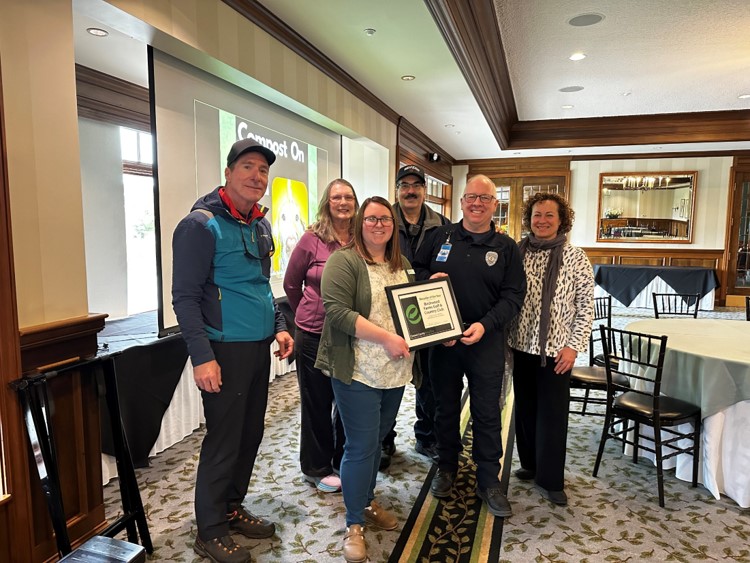
When you think of Birchwood, you probably think of the beautiful homes and green of the golf courses, not necessarily their green, sustainable initiatives. The annual recycler of the year award recognizes an entity whose program upholds the Emmet County Recycling mission to provide opportunities and education for employees, residents, businesses, and neighboring communities to reduce waste, reuse, recycle and properly dispose of materials in order to preserve the natural beauty of our northern Michigan community. This is the story of Birchwood Farms Golf & Country Club.
It started with a letter
Paul Marazzo, general manager, has been with the club since 2018. When asked about the start of the Birchwood recycling program, he remembered the recycling spark very specifically. It all started with a letter from a young lady named Abby, whose parents are members. Abby wrote that she would like to see Birchwood move toward a greener way of thinking. This letter echoed conversations in Paul’s own home and propelled the club to survey their membership about recycling. The results were overwhelmingly in support of a recycling program for Birchwood. And so it began.
The partnership between Birchwood and Emmet County Recycling began with two leased drop site bins in the spring of 2019. One bin for paper, boxes and bags. The other for mixed containers. Residents now had one convenient location to drop off their recycling and garbage, rather than self-hauling recyclables to another location closer to town. Members have mentioned how convenient it is to recycle. New members have come into the club and said THANK YOU to the staff for offering this benefit.
For the clubhouse and grounds, staff implemented a practice in the recycling world we refer to as “twin your bins.” The club purchased recycling bins to place next to garbage cans at their popular Three-Way House restaurant, where their three golf courses converge. Birchwood knew they couldn’t just plop down the recycling bins and call it a day; they had to walk the walk. They researched and changed their thought (and purchasing) process to materials that could be recycled.
Recycling seemed to be going well, but in 2021 single use water bottles became a hot topic for Birchwood. Their membership was concerned about the recyclability of the material. The staff researched and attended trade shows to find a replacement material that was more eco-friendly than the #1 PET water bottles available to members on the course and beverage carts. A better material was not discovered, but a brilliant idea did stem from this scenario. The coup de grâce of the single use plastic water bottle at Birchwood Farms was offering refillable water bottles in their pro shop for purchase and placing water coolers throughout the golf courses.
This is a fabulous example of utilizing the waste hierarchy to its full potential. Birchwood has changed their mindset to reduce and reuse, which are the most environmentally preferred strategies according to the EPA. In the recycling realm, they’re making a difference too. In the five years of operating and maintaining their drop site bins, Birchwood has diverted 119.2 tons of mixed containers and 128.13 tons of paper, boxes and bags from landfill. That is the equivalent of removing annual emissions from 157 vehicles, conserving 82,967 gallons of gasoline or conserving 30,722 cylinders of propane.
Break it down
Chuck Mullins, ACSC and Public Safety Director at Birchwood Farms, monitors the recycling bins along with his staff. During our conversation, he made it clear that Birchwood residents truly care about the recycling program, knowing it’s a benefit of their association that is not to be taken for granted. A message that rings loud and clear in their program is to break down the cardboard at the bin. Signs around the recycling area warn of a $100 fine for anyone that does not follow the rules.
Not only has recycling become part of the culture, but membership and staff are well aware of the financial benefits. It starts with paying attention to what you’re buying at the store - verifying it’s a recyclable item. The more you recycle, the less you’re throwing away, which has a dollar amount per bag. The less you’re throwing away, the more you’re saving. Taking it a step further, finding items that you can reuse has an even bigger cost savings – like Birchwood’s use of refillable water bottles versus single use plastic water bottles.
Respect the Recycling
Eva MacDonald and her family have been residents and members since 2020 and practiced recycling long before joining the club. Their family recycles not only to show their kids the importance of sustainability, but to teach them reuse. “Objects don’t go in the trash and live in the landfill forever, they can have a second life.” Cardboard lives a marvelous second life as a diorama or stage for their puppets made from popsicle sticks in the MacDonald household. And when it comes time for these materials to be recycled, “it can be done as a whole family. It doesn’t need to be a chore.”
Eva’s advice for those looking to make a new recycling habit in their house is to not get caught up in the details of what you can and can’t recycle, but take advantage of the flyers and infographics available to get informed. Tape it on the wall for your kids (and spouse!) to see and support the recycling endeavor. Make it a game!
Pride of Birchwood
Every spring, the membership comes together for a full day of clean up. Volunteers cover the property picking up fallen branches, garbage and recycling collected in the woods and grounds throughout the winter. “It’s cool to watch the membership. They motivated us into a change because they care so much about recycling, the club and their environment.” When asked for any advice for communities looking to bring recycling to their neighborhood, Paul said simply, “Start it. Build it. It brings people together.” Eva echoed Paul’s thoughts and added “it took effort for people to get it here because we wanted it. Birchwood is receptive and willing to work with membership on things you want to see for the community, making it somewhere you want to live with your kids and family. The community of recycling at Birchwood connects us.”
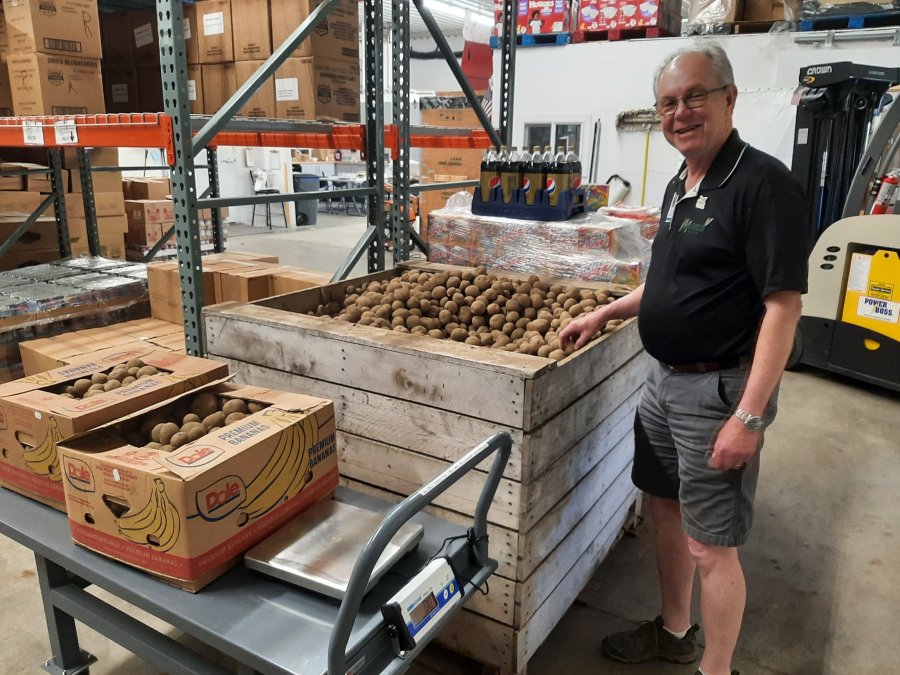
2022 - Tons of Potatoes Don’t Phase Recycler-of-the-Year-Award Winner
Potatoes. 6,000 pounds of potatoes. Who can take a donation of 6,000 pounds of good, free potatoes from a farmer and get them to people in need? Emmet, Charlevoix, and Antrim county residents know: the Manna Food Project.
Now Emmet County Recycling has presented its 2022 Recycler of the Year Award to the Manna Food Project so area residents also know what a great job they do in the realm of reducing, reusing and recycling. As Lindsey Walker, Emmet County Recycling’s commercial accounts coordinator, put it, “The Manna Food Project is an exemplary leader in waste reduction. They really do it all.”
The EPA encourages best-practices in waste management and food recovery by clearly ranking options from best to worst on “hierarchies.” (Think of the food pyramid flipped on its tip, with the best option located at the top.) Manna stands out for taking on the strategies ranked better than ordinary recycling and composting.
The popular phrase, “reduce, reuse, recycle,” captures the ranking of these options on the EPA’s ”Waste Management Hierarchy”: reducing is even better than reusing, which is better than recycling. All of these are far better than landfilling or burning waste.
Like nearly every operation of any size, the Manna Food Project recycles a lot of cardboard: an average of roughly 11 tons of cardboard a year! But before they recycle boxes they use the better option “up the hierarchy” by reusing. Specifically, they reuse banana boxes to pack food bound for the 42 food pantries they serve. “Banana boxes to us are a commodity,” said Bob MacKenzie, Manna’s Rescue Program Manager.
They also supply numerous area schools with backpacks of food that students at risk of hunger can pick up on Fridays to ensure they have enough to eat over the weekend. Manna packs the bags for each school into used boxes which the schools then return for reuse. MacKenzie estimates that each box is used eight to ten times before it wears out.
But where the Manna Food Project really shines is in managing food that might otherwise be landfilled. One of the top options on the EPA’s Food Recovery Hierarchy is using such food to “feed hungry people” and Manna does it on a grand scale. Five days a week, they collect donations of surplus food from local farms, grocery stores, restaurants, and bakeries. (Examples of these food rescue partners are featured on their website). This program rescues more than 400,000 pounds of food each year!

Next down the Food Recovery Hierarchy is feeding farm animals. When Manna has large quantities of food unfit for humans but still good, they try to provide it to farmers to feed animals, typically pigs.
And should some of the food go bad before it can be distributed—as some of the 6,000 pounds of potatoes had—Project volunteers will sort it out from the good and put it in Manna’s compost carts. The carts are provided as part of Emmet County’s commercial food-scraps collection program. The food scraps are picked up by the County once a week for delivery to the Pleasantview Road Drop-off Center. There they are combined with dry leaves and composted. The County reports that the Manna has composted over 30,000 pounds of food in just four years.
Emmet County Recycling asks everyone to join them in thanking the Manna Food Project’s staff, board, and volunteers for going the extra mile to use the best options in waste management and food recovery.
2021 - Our Always-Essential Workers
From Guest Commentary distributed by our Communications Coordinator, Kate Melby
People try to recycle the darndest things!
In late 2020, a yard sign showed up on the containers sorting line at the Emmet County recycle-processing facility. Not an election sign; it was one of those signs, common during the early months of COVID, thanking essential workers including those in waste disposal and recycling.

Yard signs are not generally recyclable. But rather than send it to the landfill, someone propped it up in a prominent corner and there is has stayed as a reminder of the community’s gratitude. However, that sign in the corner, while very nice, was clearly not enough; Emmet County Recycling’s employees deserved a more formal show of appreciation. So this year, on December 9, everyone on our team was presented our 2021 Recycler of the Year Award.
Recycling and waste-transfer-station workers have enjoyed the signs (and other as expressions of gratitude) as they have stayed on the job through all kinds of COVID challenges. During the early weeks of the pandemic—when no was sure whether the virus could spread via surface contact—they geared up and kept the recyclables and garbage moving.
The management team—all new in to their positions in 2019—made the hard calls about how to keep staff and customers safe and maintain critical operations. Again and again, as new information and mandates developed, the managers thoughtfully weighed all the factors and moved forward.
On the oddly quiet streets, curbside and drop-site recycling truck drivers picked up bins of potentially coronavirus-laden recyclables. The recycle-processing crew designed their own cardboard workstation dividers, added masks and face shields to their usual protective gear, and continued to hand sort the recyclables.
Drivers
(They primarily collect recyclables from homes, businesses and drop-off sites.)
First photo below, left to right: Curbside Drivers Lauri Robinson and Grady Smyley, not pictured Jon Zoerhof
Second photo below, left to right: Drop-site Drivers Harold Evans and Earl Marshall

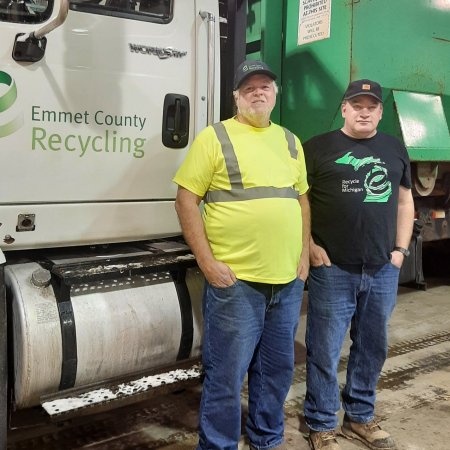
Processors
(This crew sorts your recyclables, bales and stores them, and then loads them on to the semis that haul the bales to factories.)
Kelsey Boda
John Delis
Zack Elya
Eric Franklin
Adam Morey
Gary Moyer
Jaime Pethers
Justin "Shrew" Pethers-Clear
Paige Simard (Summer 2021)
Michael Williams
Molly Zoerhof
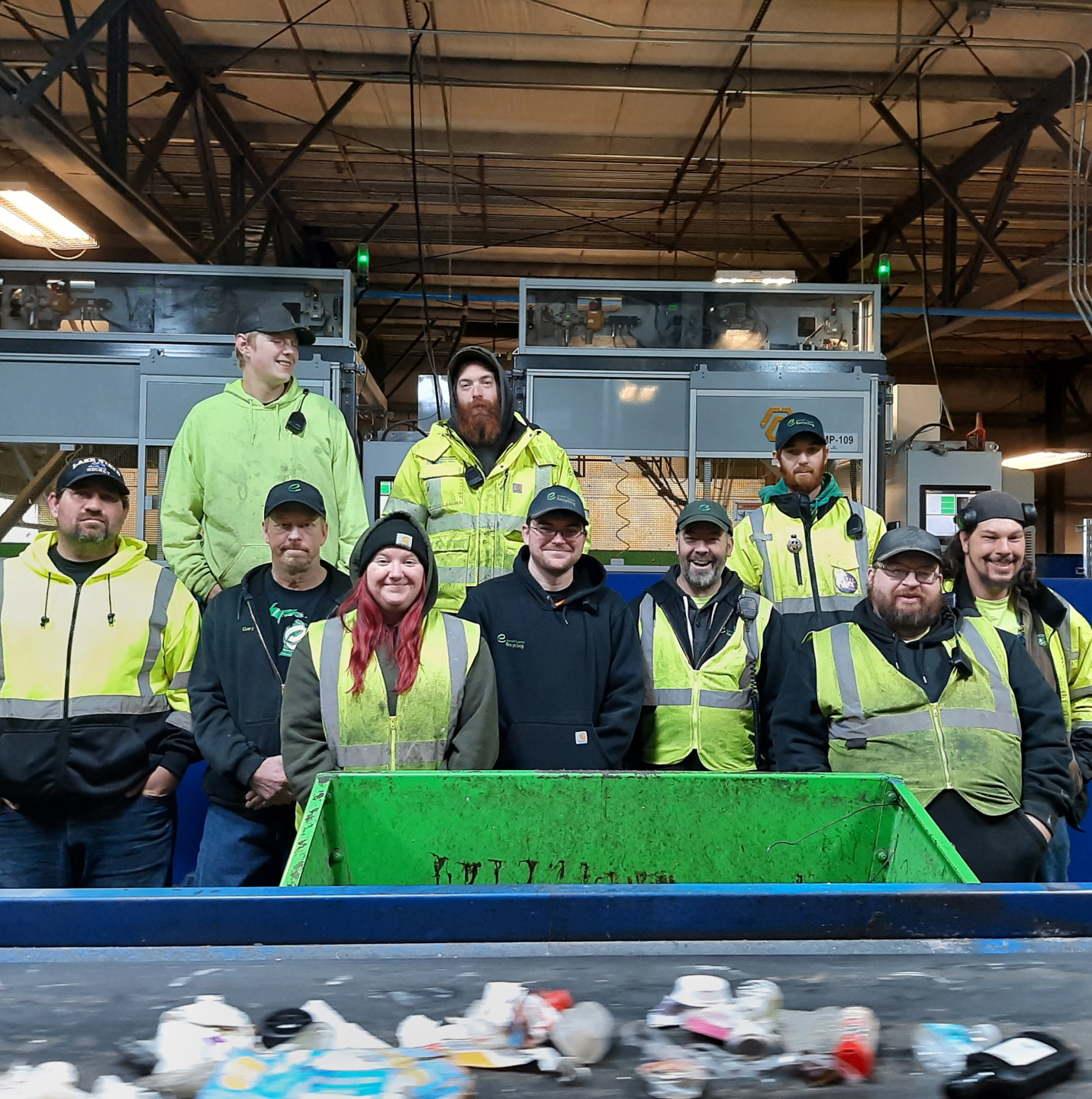
At the same time, the gatehouse attendants—with new Plexiglas shields—continued to serve the Drop-off Center’s customers. As the pandemic wore on, they managed a huge surge of transactions as residents isolating at home decluttered like never before!
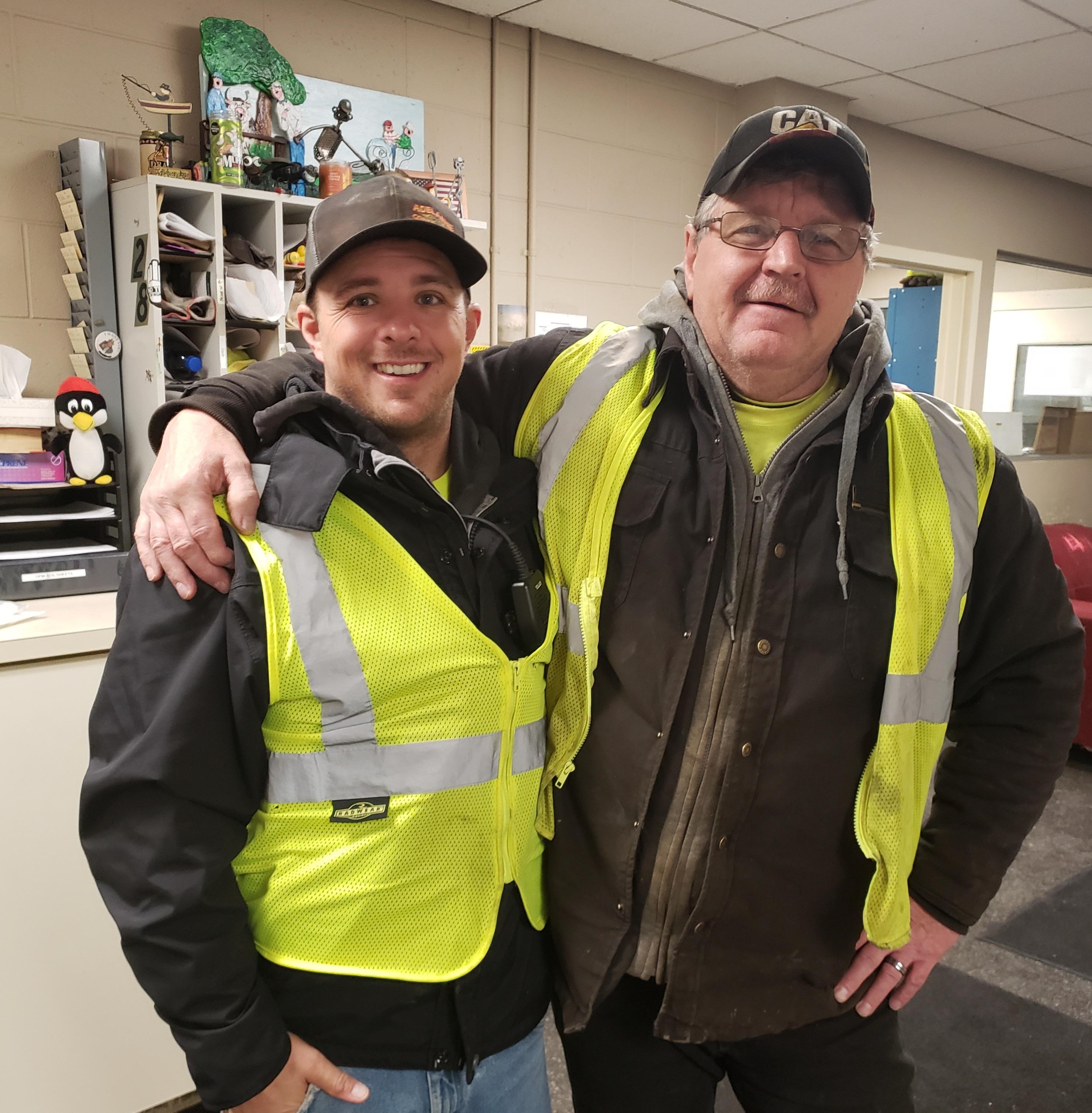
Attendants
(They primarily serve our customers at the gate and operate the waste transfer station.)
First photo below, left to right: Nate Hopkins and Mark Freske
Second photo below, left to right: Russ Schwartz, Roger Duffiney and John Harrington
Not pictured, Theo Marshall (seasonal summer 2021)
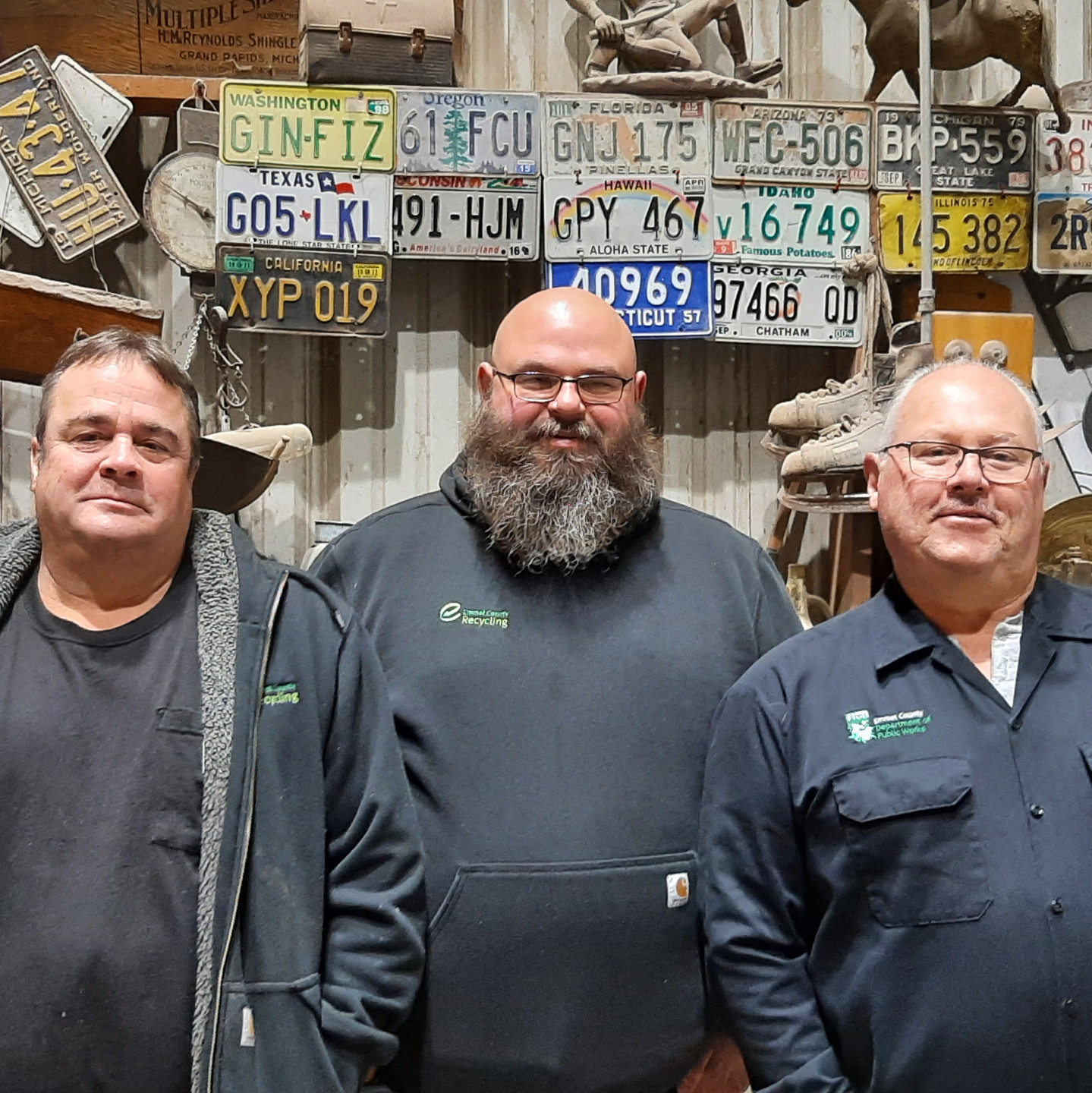
However, the essential nature of these jobs runs much deeper than continuing waste and recycling services during emergencies: Removing garbage from our communities is a critical public health service every day. Recycling is fundamental to manufacturing, the local economy, and environmental protection.
Recyclables show up back in the economy as ordinary products we encounter around us every day. Just a few examples include cardboard recycled into cereal boxes, used glass jars made into new ones, plastic bags mixed with sawdust forming the core of composite decking, and steel cans and aluminum foil items used in everything from new cans to vehicles.
Manufacturers rely on their recycled materials and struggle when supply gets tight or demand surges. For example, in 2020, shipping-box manufacturers were pinched when the sudden increase in online purchases expanded demand for boxes at the same time that suspension of some recycling programs decreased the available supply of used paper and cardboard. That pinch reflected in the market value of used cardboard, which leaped from $40 per ton to $150 per ton!
Last but certainly not least, Emmet County’s recycling team is essential to protecting the environment. Recycling has huge roles to play in conserving resources; saving energy; reducing pressure to compromise wildlife habitat to mine, log, expand cropland, or drill for fossil fuels; and cutting pollution including greenhouse gases.
To reach recycling’s potential takes dynamic management and hardworking, engaged sorters, drivers, equipment operators, and administrative staff, with all working as as customer-service people. Emmet County is fortunate to have this great team.
Everyone Else
Andi (Shepherd) Tolzdorf, Director
Wendy Fought, Superintendent
Josh Brubacher, Operations Manager
Ashley Bur, Grants and Resources Coordinator
Kate Melby, Communications and Education Coordinator
Jayna Steffel, Administrative Secretary
Lindsey Walker, Market Development and Commercial Accounts
About the Author: Kate Melby, Emmet County Recycling’s, Communications Coordinator, sprung this award on ALL of her coworkers and wouldn’t let any of them deny that they should be included.
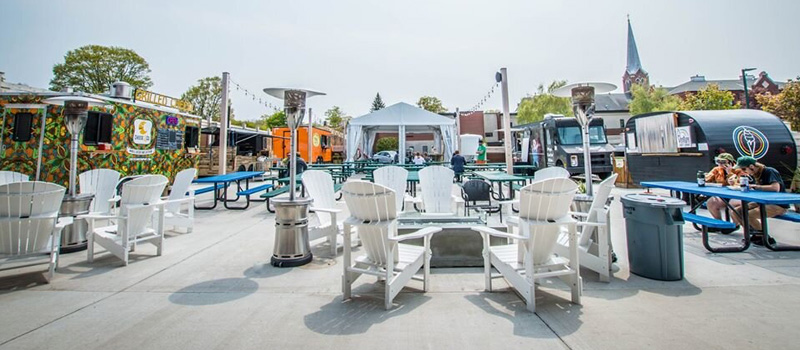
2019 - Tap 30, Pour & The Back Lot
When David Meikle and Steve Steffes opened their first restaurant in Petoskey, Tap30, they immediately signed up for Emmet County Recycling’s (ECR) curbside collection service. When ECR piloted collection of food scraps and other compostables from businesses in 2015, Tap30 was one of the inaugural customers. And they haven’t stopped taking on new sustainability initiatives since! The partners soon added Pour Kitchen and Bar, one door west of Tap30 on Mitchell Street. Then Meikle and his wife Missy built The Back Lot, a bar “with food trucks” right behind Tap30 at 425 Michigan Street. Each step of the way, as their enterprises grew, the partners and their staff took action to minimize and recover wastes from the businesses. For this proactive approach to reducing, reusing and recycling, the three restaurants and their owners have been named Emmet County Recycling’s 2019 Recycler of the Year Award winners.
As Emmet County Recycling’s commercial food scraps collection pilot proceeded, ECR staff checked in with the businesses about how it was going. In late 2015, ECR Recycling Outreach leader Lindsey Walker contacted Tap30 sous chef Justin Reyes and chef Brian Roberts to get their feedback. The two chefs reported that they were very food-waste conscious. Walker noted that they used consumer flow charts and tracked trends to be as prepared as possible to control ordering and production based on need, projecting out a year-long calendar based on business and events. Collecting the food scraps for composting (separate from the trash), they reported, was helpful not only because the scraps were composted, but because it allowed them to actually see and track their food waste. And then the chefs went on to ask if their Handy-Wacks basket-liner papers were compostable! (Answer: no, the wax isn’t compostable.)
Since then Tap30 and Pour have continued to carefully analyze their waste and seek alternatives to prevent or recover waste. They serve on real dishes and are always on the lookout for better environmental options. “We were just talking about how we are down to two ‘waste items’ left: adhesive napkin bands and take-out sauce cups. We are actively looking for better alternatives,” said the group’s marketing lead, Sandra Thomas.
“For David and his team, sustainability is not an afterthought,” Walker said. “They were thinking about these issues before they even implemented the businesses.”
The Back Lot, which the Miekle’s built from the ground up offered even more opportunities for such planning. The Back Lot is open year round, but especially features a large beer garden which hosts food trucks in the warmer months. The Lot is a “zero-waste” business, reducing, reusing, recycling or composting over 90% of the waste they generate. The bar uses glassware and offers compostable straws only upon request. From the get go, the food trucks serving at The Back Lot (TBL) have been required to use only compostable serviceware approved by Emmet County Recycling for composting at their Pleasantview Road Drop-off Center. Walker explained, “We have to be careful; there are plastic forks, knives and spoons on the market that claim to be compostable, but which won’t break down in our piles. We ask businesses and events that plan to compost waste with us to check in before they buy ‘compostable’ service ware to make sure they are getting one of the brands we can process. No one wants plastic in their compost!”
As a result of this pre-planning, TBL customers can simply toss their utensils, boats and plates right in the compost bin with any food scraps leftover from their meal. “I don’t want to misrepresent; there is some waste. But for the most part it is just what customers bring in with them, for example, baby food packaging,” said David Miekle.
In building The Back Lot, the Miekles designed in room for recycling infrastructure—a must on the otherwise tight alley—and put in a cistern to store rainwater collected from the roof. The water will be used for their decorative plantings. “And I just got done meeting with a guy to get a quote to do solar on the roof. In the summer we should be able to generate all the electricity The Back Lot uses,” said David Miekle.
ECR asks everyone to help them thank the Tap30, Pour, and Back Lot teams for their sustainability efforts and to congratulate them on their Recycler of the Year Award win.
For more information on Emmet County’s Recycler of the Year Award or to nominate an individual, institution, or business for the award, visit EmmetRecycling.org or call Kate Melby, ECR Communications Coordinator at 231-348-0640.
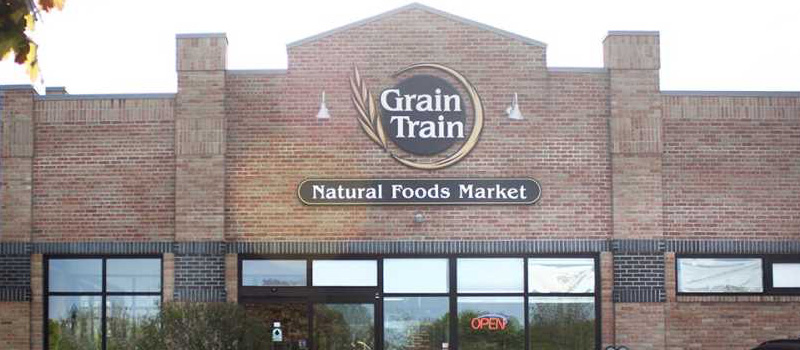
2018 - The Grain Train Natural Foods Market
Over 80% of Emmet County households recycle through the county’s system and recycling staff report constantly hearing from enthusiastic residents saying they, “recycle everything!” But even in a community of avid recyclers, the Grain Train Natural Foods Markets stand out for their deep recycling ethic. Saturday, April 28, the markets—which are cooperatively owned by roughly 2,800 area individuals and families—were honored with Emmet County Recycling’s 2018 Recycler of the Year Award.
The Grain Train’s Petoskey market’s recycling efforts are evident from the moment customers walk in the door: stacks of blue crates in the foyer are ready to receive reusable old-fashioned glass milk bottles from Shetler’s Dairy in Kalkaska. Just inside the store proper, reusable fabric produce bags made from recycled pop bottles are for sale above the fresh broccoli and beets. (Though even the produce bags off the rolls are made from recycled material.) Toilet paper and paper towel options are 100% recycled content and up to 90% post-consumer recycled.
At the self-serve food bar, waste reduction is encouraged by racks of plates, bowls, and flatware. For those who must use a carry-out container, boxes and cups are ones carefully selected for sustainability and purchased “in bulk” by the National Co-op Grocer’s Association–of which the Grain Train is one of 147 members. As an example, Chelsea Jarvis, Operations Manager, noted, “They just changed the source of the coffee cups because the ink used to print the new ones is more sustainable.” The association’s member cooperatives also share best practices and data, challenging each other to reduce waste and energy use
While many stores and restaurants recycle from their behind-the-scenes operations, the Grain Train stands out for also offering recycling front-of-house, in other words, for its customers. This is difficult because thousands of customers can’t be trained on proper recycling in the way dozens of employees can be. Jarvis noted that putting actual pictures of the recyclable items customers use in the store on the bins has been key to getting the public recycling right. The front-of-house recycling even includes collecting food scraps, napkins and paper towels for composting.
The Grain Train was founded in Petoskey in 1971 and was reducing, reusing, and recycling long before Emmet County took over local recycling services in 1990 and began expanding them. From the get-go the market offered bulk foods—which reduce waste by allowing customers to buy just what they need–and encouraged customers to buy them in reusable jars. According to Dale Scott, who worked at the Grain Train from 1983-1993, customers also brought in their extra paper grocery bags for the store to use and, “We never bought any bags in the 10 years I worked there.” Employees and community members frequently took food scraps from the store home to feed pigs and chickens or to compost.
Through the years, employees and farmers have continued to reclaim food scraps from the Grain Train to feed livestock or to recycle by composting. Putting food waste to the best possible use has been a particular focus recently. With nearly 340,000 customer visits in 2017 the numbers really added up: the stores donated 6,156 pounds of imperfect produce to the Manna Food Project and an even greater volume of packaged groceries; local farmers took roughly 72,800 pounds to feed their animals or compost; and, to help keep up with volume, the store recycled another 7,168 pounds of food scraps through Emmet County’s commercial composting service.
Behind the scenes, the stores recycle large amounts of film plastic and cardboard, and support local suppliers’ reuse efforts, for example saving carrot bins for Country Gardens, trays for plants from Bear Creek Organics, and boxes for Providence Farm. “Waste reduction and recycling is what we do. It is how we conduct our business. We don’t see it as separate,” said Jarvis.
Kate Melby, Communications Coordinator for Emmet County Recycling, presented the recycling award to the Grain Train at the cooperative’s annual General Membership Meeting, held at North Central Michigan College’s cafeteria. Surveying the dinner, Melby said, “You can see their recycling ethic right here: at a casual, off-site event, most organizations would use disposable plates, cups, and plastic flatware. The Grain Train went with THE best zero-waste option: real linens and dishes. Love it!”

2016 - Odawa Casino Resort
Emmet County’s 2016 Recycler of the Year Award winner began recycling long before they opened for business. “During construction—begun in 2005—one of the requirements the Tribe had was that everything that was recyclable be recycled,” explained Barry Laughlin, Odawa Casino Resort’s Director of Property Operations. Since opening in 2007, the Casino has been steadily growing their recycling efforts and shows no sign of stopping, earning them the 2016 Award.
Kate Mowbray, the Casino’s lead Wastewater Tech, is charged with heading up the recycling programs. According to Mowbray, when the Casino began operations in 2007, they started by just recycling cardboard, but soon added paper and mixed containers (including plastic containers, steel and aluminum cans, foil, glass and paper cartons). In recent years, they have recycled around 56 tons of cardboard and 14 tons of paper and containers annually.
They also regularly recover roughly 1,200 pounds of scrap metal, 300 pounds of batteries, and 1,000 pallets a year, the later largely reused in Casino operations and by employees. Electronics and ink cartridges are recycled too. Fluorescent bulbs were recycled, but are now being replaced with LED lighting to further improve energy efficiency. (Odawa Casino Resort won a First Place Governor’s Award for Energy Excellence in 2016.) When the uniforms for their employees—as many as 535—were last updated, the old were recycled.
Laughlin and Mowbray credit a couple of departments in particular with the success of the recycling programs. The Housekeeping staff, both at the Odawa Casino and the Hotel, is very supportive of recycling. “When they have something new—for example when replacing soap fixtures—they will come to us and ask if it is recyclable,” noted Mowbray. The Casino Maintenance Department is central to the system, hauling recyclables to the Pleasantview Road Drop-off Center.
The Stewards—essentially a specialized cleaning and stocking crew for the restaurants—have really stepped up for the Casino’s latest initiative: diverting food waste from the Waas-No-De buffet for composting. “If we didn’t have the stewarding department, we wouldn’t have recycling in the restaurants,” said Laughlin, adding shout outs to Executive Steward Sally Strauss and Stewarding Supervisor Aaron Figiel (whose nickname around the Casino is “Captain Planet”).
Emmet County has been offering collection and composting of food and floral scraps to a limited number of businesses the past two summers. Odawa signed up this summer and immediately became the program’s largest customer, diverting around 2,000 pounds of food waste a week to composting. Now the county is beginning to pilot winter food waste collection and the Casino is on board, figuring out all the logistics presented by the cold and ice.
Having the buffet’s food waste collected for composting allowed the Casino to reach a great milestone this past summer: they were able to reduce collection of garbage (handled using a waste compactor, as most large institutions do) from once every ten days to once every 20 days, saving the business tens of thousands of dollars a year.
Discussions are underway about a variety of next steps to increase the Casino’s recycling. At peak times of year, the recyclables exceed the system’s capacity to store and haul the materials. A baler on site has made cardboard storage and hauling more efficient and Laughlin and Mowbray are experimenting with baling the containers as well. They definitely plan to add food scraps collection at the Casino’s fine dining restaurant and employee cafeteria next summer.
Lindsey Walker, Emmet County Recycling Economic Development Liason summed up the Casino’s award win, saying, “The Casino stands out for the sheer volume of material they recycle, but also for the support their resource recovery programs receive from a wide range of staff. We appreciate the Little Traverse Bay Bands of Odawa’s commitment to caring for the environment and look forward to working with the Casino/Resort team going forward, to keep them on the cutting edge of reducing, reusing and recycling.”
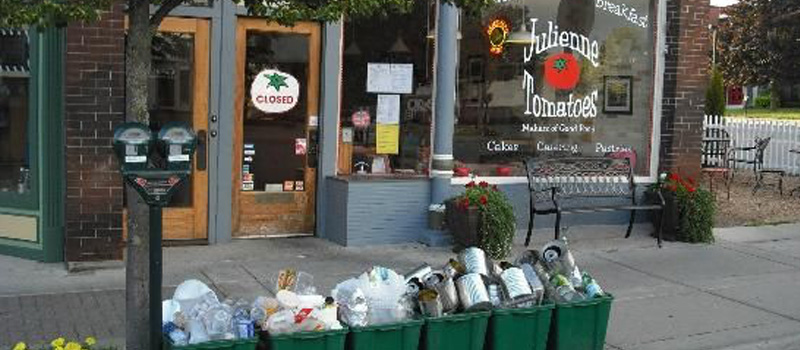
2013 - Julienne Tomatoes
The 2013 winner of the Emmet County Recycler of the Year Award is a restaurant which celebrated its 10th anniversary this summer, yet has never purchased a coffee mug. Co-owner and Chef Julie Adams laughs it off as, “…because I’m too cheap to buy new!” but the reduce, reuse, recycle ethic clearly runs deeper than just saving money at Julienne Tomatoes.
So where do their coffee mugs come from? Whenever their supply of mugs gets low, they just put out the word—this year in a Facebook post–and people bring them mugs. Sometimes a business or institution will bring them a bunch of promotional mugs, but more often it’s just, “random people bringing random mugs.”
The décor at Julienne Tomatoes hangs together so harmoniously that customers might not consciously notice that the reuse goes beyond the coffee mugs. Tom Sheffler, the eponymous “tomato” partner in the venture, recalls that they got the tables and chairs second hand, here and there. “I don’t think we paid over $20 for a chair or over $60 for a table.” The big community table at the front of restaurant was a gift one of the leaders of the Young Americans. And much of the tomato-themed art on the walls also came to the pair as gifts from enthusiastic customers.
The partners’ frugality does not extend to the restaurant’s ingredients—they’re impeccably fresh, top-of-the-line and, as much as possible, local. But the reuse continues with the incoming packaging. Produce crates for Coveyou Scenic Farm and clean egg boxes and trays for Cook Family Farm are stacked neatly in the basement waiting to be reused. Their maple syrup and honey suppliers—Harwood Heritage in Charlevoix and Indian River Wilderness Honey–bottle their honey syrup in glass jugs which are sterilized and returned for refilling. On the other end, Tip of the Mitt Watershed Council uses the restaurant’s 5-gallon pickle buckets for water sampling. Gallon glass jars are given away to happy reusers, too.
Recycling is a given at Julienne Tomatoes (JT). Asked if they recycled the first year they were open, before curbside recycling was available, Julie didn’t recall, “I can’t remember when we didn’t recycle,” she said. What is most remarkable about their recycling efforts is the way they take it beyond simply putting milk jugs, steel cans and the like in the bins. Tom put a picture of their small fleet of recycling bins, neatly set out at the curb, on the “We’re Involved” page of their web site. They have made a point of buying paper towels manufactured by Great Lakes Tissue in Cheboygan which are made from recycled paper cartons–including JT’s half-and-half cartons recycled through Emmet County–and then posted about it on Facebook. Amazed that, “…the kids don’t know,” they teach any new employees who don’t already participate how to recycle. They have repeatedly donated lovely breakfasts for staff meetings at the Emmet County Recycling Center (held at 6:30 a.m. before all the trucks head out). They even pop out and give their recycling truck driver a soda or coffee!
Julienne Tomatoes helps their customers recycle, too. Julie abhors Styrofoam and makes a point of choosing recyclable containers for carry out, even though they cost considerably more. Their trays for carry-out hot entrees are dishwasher safe and reusable, while frozen take-and-bake entrees come in an aluminum pan with a recyclable plastic lid.
Despite their outstanding reuse and recycling efforts, Julie and Tom and their staff are not satisfied to rest on their laurels. The next frontier for them, recycling-wise, is composting their kitchen scraps. A local farmer has approached them about picking up their back-of-house compostables to enrich the soil on his farm.
In presenting JT’s Recycler of the Year Award, Emmet County Recycling Director Elisa Seltzer said, “Your recycling—and reuse–is as outstanding as your cooking and that’s saying a lot! Thank you for recycling and for your support of Emmet County Recycling.” Seltzer encourages everyone to stop by Julienne Tomatoes, buy a sandwich, congratulate them, and give them a stray mug.
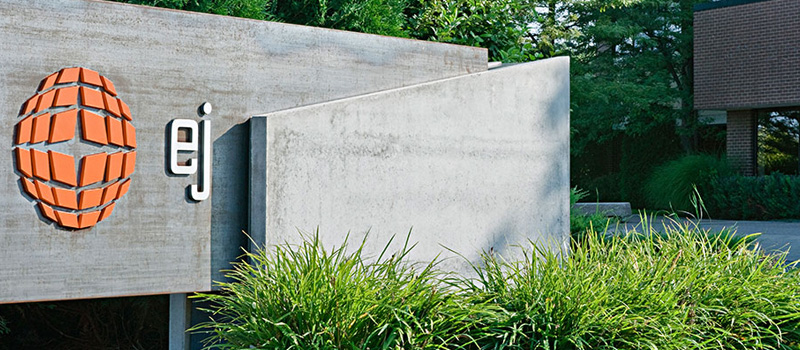
2012 - EJ (East Jordan Iron Works)
Emmet County Recycling’s 2012 Recycler of the Year Award winner has small town roots, but international reach. Travel to any city and the company’s goods are likely underfoot: production one day recently included fire hydrants for Chicago, tree grates for Philadelphia, and manhole covers for Bell Canada. In total their products are used in 140 countries and, following numerous acquisitions over the past 25 years, their operations span five continents. The winner is EJ, formerly known in this area as East Jordan Iron Works. Along with its corporate headquarters, one of the company’s two U.S. foundries is located in East Jordan. EJ also has a water products machining, assembly and manufacturing facility in the area.
While 2012’s is Emmet County’s 11th Recycler of the Year award presentation, the East Jordan Foundry is the first manufacturing facility using recycled materials from the Emmet County Materials Recovery Facility (MRF, or recycle processing facility) to win the award. EJ cast iron products average 85% recycled content. This recycled content includes steel (“tin”) cans from the Emmet County MRF: those recycled by residents of Charlevoix, Emmet, Cheboygan and Presque Isle Counties. However these are the only cans used as EJ feedstock because the blocks of cans produced by most MRFs are of a size and consistency that aren’t compatible with handling equipment at the East Jordan foundry. More typical sources include auto scrap, obsolete scrap appliances and steel from demolition of buildings collected by scrap metal yards, like A&L in Gaylord.
EJ has been buying bricked (compressed into blocks) cans from the ECMRF since 2001. Emmet County Recycling Director Elisa Seltzer remembers developing the system. “When we approached EJ about recycling our tin cans, they informed us we’d need special sorting techniques and equipment to meet their specifications,” she said. “Eager to secure a local market, in 2001 we found a used bricker and had it refurbished. It is still in use today.” The “bricks” are about the size of a microwave oven and weigh roughly 90 pounds each. In 2011 EJ bought 104 tons of bricked cans from the ECMRF.
“We’re constantly working to develop uses for our waste streams,” said Tom Teske, EJ Americas Vice President and General Manager. Recycling at EJ is part of the process as well as the product. They recycle all of their paper through a shredding company and collect cardboard, bottles and cans as well. Hazardous materials like fluorescent lamps, aerosol cans, and electronics are recycled, too. Even their office building is reused: a portion of the headquarters structure was at one time a creamery.
Foundry byproducts from melting and molding processes are their biggest out-bound recyclables. Slag—a gritty, tan mineral material produced in the melting process—is spread on area dirt roads in place of sand to improve traction when conditions are icy. The green sand which makes up casting molds is reused in production, then, at the end of its usable life, a lot of it is used by St. Mary’s Cement in Charlevoix.
From these green beginnings, EJ infrastructure access products go on to green futures. Teske noted that they serve important functions in water, sewer and energy distribution systems. And though the creation and distribution of cast iron products is energy intensive, they are very long lasting. Because of their recycled content, EJ products are often used by architects and engineers to help earn points toward achieving LEED (green building) certification for their construction projects. Their cast iron fixtures are naturally rust resistant and do not require any finish coating. And finally, at end of their useful life, they can be recycled once again.
For more information on the company visit them on the web at www.ejco.com.
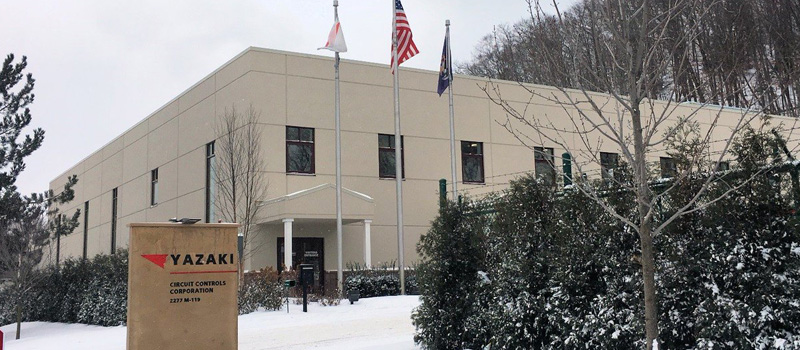
2011 - Circuit Controls Corporation
Emmet County has awarded Circuit Controls Corporation (CCC), a subsidiary of Yazaki North America, its 2011 Recycler of the Year award for achieving zero waste in its facility.
CCC, a tier-two automotive supplier, produces connectors for wire harness manufacturers throughout the world. This year they will manufacture seven billion connectors, while creating near zero waste in the process.
CCC is also a highly responsible environmental leader. A Michigan Clean Corporate Citizen, CCC’s environmental management system is International Standards Organization (ISO) 14001 certified. In recognition of their outstanding recycling efforts reflected in the Zero Waste designation, Friday, December 9, CCC received Emmet County Recycling’s 2011 Recycler of the Year Award.
“Zero Waste” is a philosophy that promotes product life cycle management in order to eliminate unusable waste. CCC’s Zero Waste initiative began as a corporate directive from Yazaki to reduce waste going to landfills to less than one percent of 2006 levels. CCC has exceeded the goal, reducing its waste stream to three-tenths of one percent of its 2006 level. While truly remarkable, this achievement is part of a larger environmental bright spot. A 2004 survey found that more than 2,700 Japanese companies had achieved 90 percent reductions in their landfill waste.
CCC’s produces electrical terminals-tiny pairs of sockets and plugs that are crimped onto the ends of the wires in wiring harnesses. The wiring harnesses are used to distribute power for the electrical systems in vehicles. The terminals are cut from shiny ribbons of copper by 47 high speed stamping presses. In 2010 they shipped 6.4 billion terminals in approximately 265 different designs, supplying automakers around the world. The facility employs approximately 150 people and recently reported that it expects that number to grow to 200 by 2017.
How does a company reduce waste going to the landfill so dramatically? Recycling is the bulk of it. According to data provided by Jack George, Environmental, Health and Safety Manager at CCC, through October of this year CCC has recycled:
37,880 pounds of cardboard
12,387 pounds of paper
6,849 pounds of plastic
5,780,892 pounds of metal
Discussing the process, George highlighted the role of the local recycling program, “Emmet County Recycling (ECR) has been an important partner in our efforts to reach Zero Waste. With the addition of new plastics and other items to their recyclable list, we have been able to recycle even more. Our major accomplishments in this area have been to recycle label backer (paper) and plastic banding. Additionally, I’m thankful for our growing relationship with ECR and their willingness to explore new options and opportunities to keep our wastes out of local landfills.”
In addition to their recycling efforts, CCC also follows a robust reuse process, treating their own waste water in a closed loop system with no discharge. Their mop water is filtered and reused in a system which captures oils and bits of scrap metal for recycling. They have worked with suppliers to redesign packaging to be returned to the supplier and reused.
The list of CCC waste reduction, reuse and recycling initiatives are generated by employee insights into the processes they manage. Two 2011 additions are filtering and reusing oil applied to the stamping dies and collecting employees’ personal recyclables on the factory floor and in the lunch room.
“CCC’s constant efforts to improve their processes to make them less wasteful are very impressive,” said Emmet County Recycling Director Elisa Seltzer. “They’re systematic about it and it has really paid off, both on their bottom line and in their disappearing waste dumpsters.”
About Yazaki
Yazaki Corporation is a global leader in the research, development and delivery of vehicle power and data solutions for vehicle applications. Yazaki produces electrical distribution systems, Vehicle Information Products, solid-state power centers, connection systems and electronics. Worldwide, the company employs nearly 200,000 people in 39 countries. Yazaki has been committed to the preservation of the environment for over 70 years. The company continues this commitment today through the development of advanced electric components for hybrid electric vehicles, the promotion of recycling and the efficient use of resources. For more information about Yazaki North America, Inc. and its vision for a greener tomorrow, log onto www.yazaki-na.com.

2010 - Public Schools of Petoskey
When Denny YoungeDyke was hired as Facilities Director for the Public Schools of Petoskey in 2005, he immediately made his mark in the minds of the staff of Emmet County Recycling (ECR). “Despite the efforts of many parent and staff volunteers, recycling at the schools had been rather hit or miss, but as soon as Denny came on board, he called us up and wanted to take it to the max,” said Kate Melby, ECR Communications Coordinator. “We were in awe!”
In recognition of all the schools have accomplished under YoungeDyke’s leadership, Emmet County has awarded the Public Schools of Petoskey its 2010 Recycler of the Year. A plaque was presented to YoungeDyke at the school board meeting on Nov. 18.
YoungDyke downplays his role and points to Lindsey Walker, who sets up commercial accounts for ECR, and the staff at various schools for the district’s recycling success. “Lindsey has been amazing. She’s always got more ideas to help us move forward and energy and enthusiasm to make it happen,” he said. And he gives a great deal of credit to the school custodians as well. “When I first met with them, I wasn’t sure how they’d feel about it [increasing recycling], but they were all about it. They all realize the value of it.”
Emmet County Recycling had previously recognized the Petoskey school district for initiating a program to pick up paper for recycling on its inter-school mail route and delivering it to the Dunham’s drop site. However, what was collected at each school and how much depended on parent and staff volunteers.
In 2005, YoungDyke signed the schools up for the then-new curbside recycling program to collect the paper. Custodians work with students at each school to collect the paper and get it out to the curb each week. “We make a point to involve the students as much as possible in the process.” YoungDyke said. “The special education departments, led by Melanie Wagner at the Middle School and George Armstrong at the High School, and their students have really taken this on. At the elementary schools different classes and groups have taken the lead – usually the older kids who are more able to lift the bins.”
With paper recycling off the ground, YoungeDyke went on to increase the efficiency of the schools’ cardboard recycling, and soon added collection of metal and plastic containers from the schools’ kitchens. Next came collecting water and juice bottles at basketball and football games. The schools also recycle their fluorescent light bulbs, electronics, and batteries.
The impact has been substantial. In 2009 the schools recycled roughly 100 tons of paper, conserving an estimated 1,700 trees and enough energy to power 14 homes for a year.
Fiscally, recycling and waste reduction have been wins too. In 2005, the schools spent $32,000 on garbage disposal. In 2010, that number was down to $22,000. According to YoungeDyke, Ottawa School, for example, has gone from 12 yards of garbage a week to eight yards a week. And at Lincoln they’ve gone from 12 yards a week to four a week. “We work with Little Traverse Disposal and Arvin Warner, the owner, there has been wonderful, actually letting us know when we’re not using the full capacity of our Dumpsters and suggesting downsizing.”
Lincoln Elementary School brings another recycling standout to YoungeDyke’s mind: Marta Dennis. The school has created a “Simple Six” program to educate students about waste disposal at lunch. And at Dennis’ initiative, the PTO bought a bin to compost food scraps. YoungeDyke helped them locate a used greenhouse to house the composter over the winter. “They haven’t made enough dirt yet, but eventually they want to use the dirt from the composting to raise vegetables and then eat the vegetables in the lunchroom,” he explained.
Asked what’s behind his commitment to recycling, YoungeDyke laughed and said, “My wife, Diane. She’s a huge recycler.” “I live in Gaylord,” he continued, “I come over the hill into Petoskey in the morning and see the Bay. Do we want to pollute northern Michigan? I’m hoping to have grandkids soon and I want them to see the same thing when they come over that hill. I look back to when we didn’t [recycle] and think, ‘What were we thinking?’ It just makes sense. When it doesn’t cost more? Why not?”
Still, YoungeDyke sees more potential for more recycling at the schools. “We’re not capturing nearly all the paper we could. And we could reduce waste more too. For example, staff are starting to get into the thought process: Think before you print. Can I get this information out electronically instead of making copies? We could use a lot less copy paper.” To that end, YoungeDyke authored a Waste Reduction Plan for the Schools which aims for constant improvement in waste reduction, reuse and recycling. The goals are both to save resources and to educate.
“Recycling in schools has a special place in our hearts,” said Elisa Seltzer, Director of Emmet County Recycling. “Of course they’re large institutions and generate a lot of material, but it goes way beyond that. Recycling in schools helps spread the message that this is what we do with discards in Emmet County: we harness them to conserve the environment, supply industry, and create jobs. Denny YoungeDyke and the Petoskey Public Schools have been wonderful partners to work with.
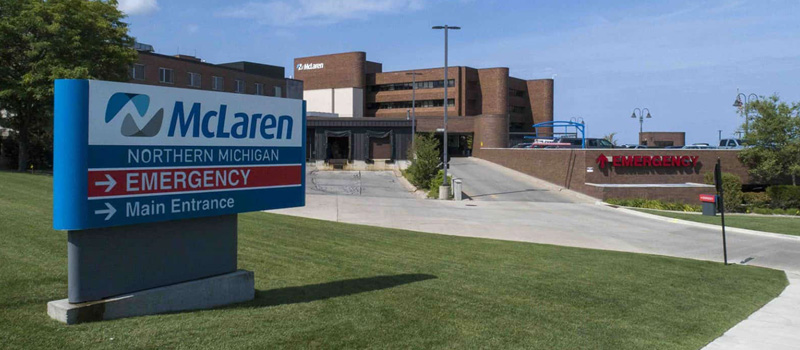
2009 - McLaren Northern Michigan
“Going green” is all the rage, so it is wise to take green claims with a grain of salt. However, when Northern Michigan Regional Hospital’s summer 2007 Community Connection newsletter said, “While the health of their patients is number one, the health of their environment is a close second for the employees of Northern Michigan Regional Hospital,” they weren’t blowing smoke. Now, their extensive recycling efforts have earned them Emmet County Recycling’s 2009 Recycler of the Year Award. Emmet County Recycling Director Elisa Seltzer presented the award to the Hospital on Tuesday, December 8.
“I always knew there was a lot of interest in recycling among the hospital’s staff,” said Emmet County Recycling (ECR) Communications Coordinator Kate Melby. “We’d periodically receive calls from hospital ‘colleagues’―as they call them―asking for input on setting up recycling. And if I was at the hospital with my family, whenever my line of work came up in conversation the colleagues would invariably have questions about recycling materials from their department. Now we’ve really seen that commitment come to fruition as they’ve made dozens of changes to reduce, recycle, and reuse.”
Linda Ward, Senior Director of Hospitality Services, gets much of the credit for the Hospital’s recycling accomplishments, according to Lindsey Walker who sets up commercial accounts for Emmet County Recycling. “Linda is a go-getter. She coordinates recycling and really brought it all together.”
In 2008, Northern Michigan Regional Hospital recycled over 50% of the 786.5 tons of waste generated by their operations. Recycling included: 39 tons of cardboard, 1.8 tons of #1 and #2 plastics, 3 tons of aluminum cans, 1.36 tons of batteries, and roughly ¾ ton each of steel cans and fluorescent light bulbs. Paper didn’t go to waste either: 179 tons were recycled with medical documents pre-shredded by a professional document destruction company. In addition, 92.5 tons of stone, rubber and concrete were recycled when the main building’s roof was replaced with a better insulating material.
The Hospital reduced waste by switching from bottled water to washable cups for patient meals, meetings, and events and by encouraging employees to tag their e-mails with a tree logo and the line, “Please consider the environment before printing this email.”
A new needle disposal system prevented 24.58 tons of waste by simply replacing disposable sharps containers with a service which provides ones which are sterilized, inspected and reused. “We go through roughly 200 sharps containers a week,” explained Ward.
In all, through recycling and reuse the hospital prevented 392.3 tons of waste in 2008. That’s not the end of the story, though. “They’re always looking for that next thing to recycle,” said Walker. Most recently the Hospital asked her about recycling #5 plastic tray covers. “We’re looking into it,” Walker continued, “They’re an ideal partner for us to try out new things.”
The colleagues’ commitment to recycling extends even beyond the Hospital’s offerings, Walker shared, “Lillian Hart-Baker organized a shoe drive which collected 1,000 pairs of shoes for reuse through Soles for Souls.”
“We salute Northern Michigan Regional Hospital for their exceptional recycling efforts,” said Elisa Seltzer, Director of Emmet County Recycling. “Changes in housekeeping systems are particularly difficult for medical facilities due to the numerous standards with which they must comply. Despite these very real challenges, recycling has taken off at the Hospital in the last four years and both the volumes they’re achieving and their attitude are outstanding.”


















